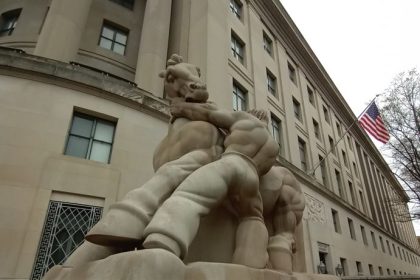States Sue Trump Administration Over Lower Fuel Efficiency Penalties

Twelve states are suing the Trump administration over its decision to deeply roll back potential penalties against automakers that violate federal fuel efficiency standards.
The National Highway Traffic Safety Administration proposes a 61 percent reduction in penalties for violations of motor vehicle average fuel economy standards as a response to complaints from auto companies.
The lawsuit filed in federal court in New York Friday seeks a court order to reinstate the stiffer penalties.
The dispute is one of several legal battles the Trump administration is waging in federal courts over its policies that seek to help businesses but threaten harm to the environment.
Some of the others resulted from government leases that allow oil and gas companies to drill on federal land.
A statement from the states’ attorneys general called lower auto emission penalties an attack on clean air standards.
They prefer a corporate average fuel economy, or CAFE, standard set under the Obama administration. It would impose fines of $14-per-tenth-of-a-mile for exceeding the CAFE miles-per-gallon targets.
A National Highway Traffic Safety Administration rulemaking process that dropped the penalty to $5.50-per-tenth-of-a-mile became final on July 26.
The federal agency said in its notice of rulemaking that “the $14 penalty will lead to a negative economic impact that merits leaving the CAFE civil penalty rate at $5.50. Based on available information, including information provided by commenters, the effect of applying the 2015 act to the CAFE civil penalty would potentially drastically increase manufacturers’ costs of compliance.”
Some environmental groups, such as the BlueGreen Alliance and the Union of Concerned Scientists, disagreed. They said worse economic and environmental consequences would come from lowering the penalties.
A recent BlueGreen Alliance report said a rollback of the fuel economy standards would cause the loss of 89,000 to 202,000 jobs, much of it from lost opportunities to produce technologies that comply with the CAFE standards.
The Union of Concerned Scientists referred to the BlueGreen Alliance report in a statement that said, “The [federal] agencies have ignored the latest scientific data and analysis, the results of which will be tangible negative impacts on the environment, consumers’ pocketbooks, and, as this report shows, on innovation, technology deployment and jobs.”
Trump administration officials relied on a recent Office of Management and Budget assessment to conclude that “increasing the CAFE civil penalty rate by the otherwise required amount will have a negative economic impact.”
Auto manufacturers paid more than $890 million in CAFE civil penalties through their model year 2014 vehicles, according to the National Highway Traffic Safety Administration’s Federal Register notice. They paid additional money to comply with vehicle emission standards.
The biggest fine was $30,257,920 paid by DaimlerChrysler for its import passenger car fleet in 2006, the Federal Register notice said.
“Since model year 2012, only Jaguar Land Rover and Volvo have paid civil penalties,” the agency reported.
Statements from the states’ attorneys general were in agreement with the environmentalists.
“Fuel efficiency standards are the heart of our country’s efforts to improve our air and protect us from the threat of climate change,” New Jersey Attorney General Gurbir S. Grewal said in a statement. “The auto industry needs to know that a penalty for breaking our laws is more than just the cost of doing business.”
The lawsuit filed Friday represented a second effort by the attorneys general to cancel a Trump administration auto emission policy through court action. The states succeeded in a lawsuit filed in 2017 to require the tougher CAFE standards. The National Highway Traffic Safety Administration rulemaking appears to be an attempt to override the earlier court order.
California Attorney General Xavier Becerra said he would try again to keep the CAFE standards enacted in 2015, saying they helped the economy and public health.
“We were victorious in our earlier court battle against President Trump in maintaining the CAFE penalty level that accounts for inflation as required by law. Now the Trump administration seeks to make these penalties meaningless,” Becerra said. “We’ll take on this latest wrong-headed maneuver with the same vigor that defeated the administration’s first attempt at backsliding.”
The lawsuit was filed in the U.S. Court of Appeals for the Second Circuit by attorneys general from California, Connecticut, Delaware, Illinois, Maryland, Massachusetts, New Jersey, New York, Oregon, Rhode Island, Vermont, Washington and the District of Columbia.
The case is State of New York et al. v. National Highway Traffic Safety Administration et al. in the U.S. District Court for the Second Circuit.























